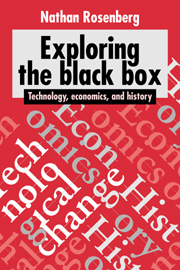Book contents
- Frontmatter
- Contents
- List of figures
- Preface
- Introduction
- Part I Dealing with an uncertain future
- 1 Path-dependent aspects of technological change
- 2 Charles Babbage: pioneer economist
- 3 Joseph Schumpeter: radical economist
- 4 Technological innovation and long waves
- Part II Technology in context
- Part III Sectoral studies in technological change
- Index
3 - Joseph Schumpeter: radical economist
Published online by Cambridge University Press: 12 November 2009
- Frontmatter
- Contents
- List of figures
- Preface
- Introduction
- Part I Dealing with an uncertain future
- 1 Path-dependent aspects of technological change
- 2 Charles Babbage: pioneer economist
- 3 Joseph Schumpeter: radical economist
- 4 Technological innovation and long waves
- Part II Technology in context
- Part III Sectoral studies in technological change
- Index
Summary
This chapter will deal with Schumpeter's book, Capitalism, Socialism and Democracy, as the mature statement of the most radical scholar in the discipline of economics in the twentieth century.
Of course, I do not mean to suggest that Joseph Schumpeter held views on the organization of the economy, or society generally, that make it appropriate to label him as a radical in the political sense. In his social and political views Schumpeter was anything but radical. In fact, one could make a case – although I do not propose to do so – that Schumpeter was not merely conservative in his social views, but reactionary. In his most private thoughts, as suggested by a recent biography, he seemed to possess an insatiable longing for the glorious later days of the Hapsburg monarchy. Moreover, the most charitable characterization of his attitude toward Nazi Germany in the darkest days of the 1930s and the Second World War is that he was ambivalent.
The reason I propose to call Schumpeter a radical is that he urged the rejection of the most central and precious tenets of neo-classical theory. Indeed, I want to insist that very little of the complex edifice of neo-classical economics, as it existed in the late 1930s and 1940s, survives the sweep of Schumpeter's devastating assaults. But in examining Schumpeter's criticisms, it is not my primary intention to enlist his authority in an attack upon neo-classical economics. Rather, I propose to show that the quintessential, later Schumpeter, the author of Capitalism, Socialism and Democracy, held views that were not only genuinely radical, but that are deserving of far more serious attention than they receive today, even, or perhaps especially, …
- Type
- Chapter
- Information
- Exploring the Black BoxTechnology, Economics, and History, pp. 47 - 61Publisher: Cambridge University PressPrint publication year: 1994
- 7
- Cited by



